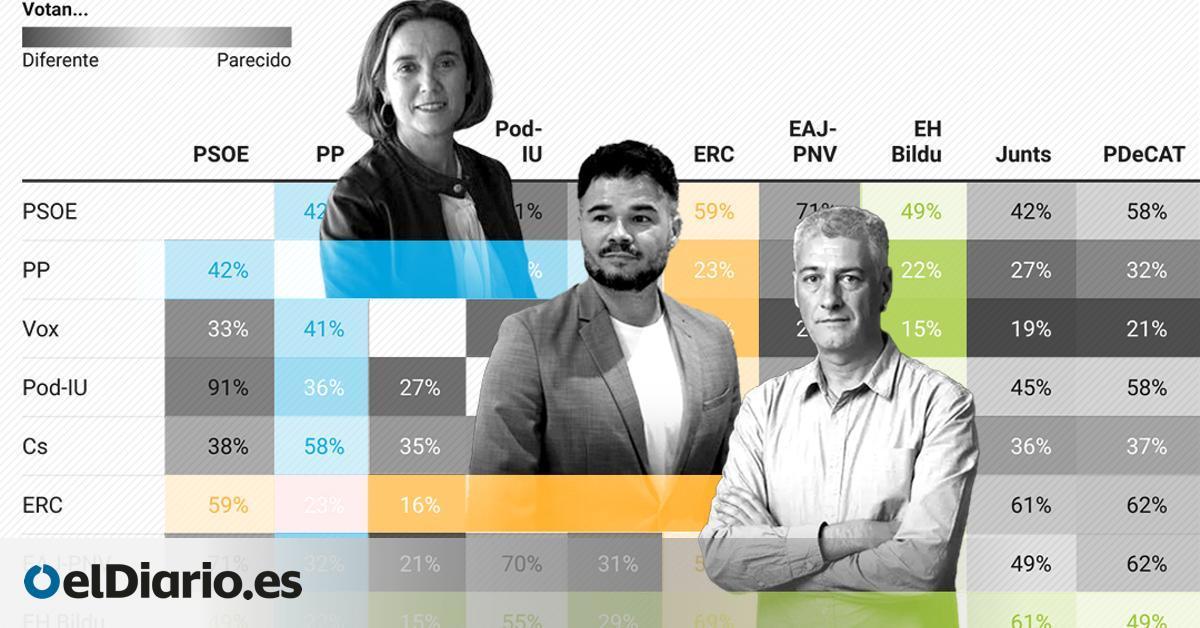
PP and EH Bildu have voted the same in 22% of the votes that took place in Congress in the last legislature, that is, on more than one in five occasions. The percentage rises if only the votes of the purely legislative task of the Lower House are taken into account. Between opinions of commissions on legislative initiatives, validation of Royal Decree-laws and direct procedures and in a single reading of laws, PP and EH Bildu have voted the same 37% of the time.
How the electoral system benefits the less populated provinces and the two big parties
Further
An analysis of the 6,578 votes that took place in Congress in the recently completed legislature also refutes the thesis on which the PP, and also Vox, are trying to get him to pilot the campaign: that in the last four years EH Bildu has been the The main partner of the coalition government and that the Executive temporizes with ETA, the terrorist group that has not killed since 2011, which disappeared in 2018 and whose activity the nationalist left has affirmed that “it should never have occurred”. The slogan “vote you Txapote”, alluding to the ETA member who murdered, among others, Gregorio Ordóñez or Miguel Ángel Blanco, has been used by PP, Vox and their supporters in recent weeks, despite numerous criticisms from victims of the terrorism that accuse the right wing of using their suffering for electoral purposes.
In reality, the vote coincidence between PSOE and EH Bildu was 49% if all the votes are taken into account, with measures of a social nature such as the improvement of minimum and non-contributory pensions, the housing law, as well as the Budgets after agreeing investments in Euskadi. It is a higher percentage than in the case of the PP, although it does not reach, in any case, half of the votes.
These data have been calculated from the detail by deputy of all the individual votes in plenary sessions in the last legislature, downloaded from the Congress website and analyzed by elDiario.es. The deputies have been grouped according to the party for which they presented themselves in 2019, filtering and regrouping the smallest. Subsequently, the direction of majority vote of the group has been assigned for each vote. [Ver metodología]
The coincident vote between EH Bildu and the PP has as its most symbolic example the vote on the government’s labor reform, in February 2022. Both parties opted for ‘no’ and only the mistake of the popular deputy Alberto Casero – who was wrong and voted yes electronically – allowed the Executive to carry out the reform, by a single vote. More recently, but also together with the popular ones, the formation of the Abertzale left voted against the reform of the Citizen Security Law, known as the ‘gag law’, because the text did not include some of their claims. Their votes, also linked to those of ERC, Vox and Ciudadanos, for different reasons, caused the initiative to decline, which was one of the great promises of the Government for the legislature.
Coincidences with PNV and ERC
These are just two examples, but PP and EH Bildu also coincided in numerous votes during the state of alarm caused by the pandemic. Both forces knocked down together the royal decree-law with which the Government wanted to collect the remnants of the municipalities. And the two also voted against the royal decree that limited the temporary nature of public employment.
All in all, the coalition that integrates the Abertzale left (EH Bildu is a coalition of Sortu –heir to the old Batasuna–, EA –split and later former ally of the PNV– and Alternatiba –split from IU in Euskadi–) is neither much less the party that most coincided in the vote with the forces of the Government. From the analysis of the voting, it can be concluded that the PNV has been the force with which the PSOE (71% of the times) and Unidas Podemos (70%) have voted the most, followed by the ERC (54% in the case of the PSOE and 61%, in the case of Unidas Podemos) and the PDeCat (58% in the case of both government formations).
In the legislative votes, in addition to the logical coincidence of the vote between the PSOE and Unidas Podemos in 99% of the votes (in all but two: the modification of the ‘only yes is yes’ law and the audiovisual communication law, when the confederal group abstained) also highlights that the PNV was the party that voted the same as the two members of the Executive. Between projects, propositions and proposals to reform the law and royal decrees, the Basque nationalists agreed with the government parties, voting the same in more than 80% of the initiatives. With EH Bildu it was less than 60%.
The PP voted more times with the PSOE than with Vox
Taking into account all types of voting, the party with which the PP coincided most times in the direction of the vote was Ciudadanos (58% of the times). What is striking is that the second force with which the popular voted the same more times in the last legislature was the PSOE, which Alberto Núñez Feijóo’s party refers to as the ‘sanchista’ party whose government action, ‘sanchismo’, it has been proposed to repeal. Both coincided in 42% of the votes, a percentage that rises to 50% in those referring to legislative action. In other words, the PP voted more times with the PSOE than with Vox, its partner in communities and town halls, with which it coincided in 41% of the total votes. Regarding specific voting on legislative initiatives, both parties coincided 51% of the time. With EH Bildu, Feijóo’s party coincided in 37% of the final legislative votes.
The position of each party, vote by vote
Position of each party in each of the final votes on Bills, Law Proposals, Law Reform Proposals, Royal Decree-Laws and legislative initiatives of direct processing in the last legislature in the Congress of Deputies. Each line corresponds to a vote, ordered chronologically. Click on each circle to see the details of the vote. You can select the matches of the legend to hide them and show only the ones that interest you
*A single direction of voting has been assigned to each group on each occasion according to what its members had voted in majority, although sometimes there was a particular vote. Parties with less than 4 deputies have been excluded
Source: Congress of Deputies
Other striking figures are those referring to the positions that Ciudadanos adopted before the proposals that were voted on in the Lower House. The party that is in the process of collapse coincided with PSOE and Unidas Podemos in 70% of the legislative votes, but there were also numerous occasions in which they voted the same as nationalist forces such as the PNV (64%) or the PDeCat ( 66%), and that the party that calls itself “liberal” has always presented itself as one of the champions against the pro-sovereignty forces.
——————————
our voice is needed
Without an independent press, they will not be able to resist democratic rights and freedoms and that is why elDiario.es has become a very uncomfortable medium, which some would like to keep quiet about. We are one of the few reference newspapers that remains free, that does not whitewash the ultras or is captured by the right. You, who read us regularly, know it well. Can you imagine what journalism would be like in Spain if elDiario.es did not exist? What would public debate be like without our voice? Can you imagine what Spain we would have?
If you’re worried about what might happen in this country, support us. Today we need you more than ever. Become a member, become a member, of elDiario.es.
Source: www.eldiario.es

